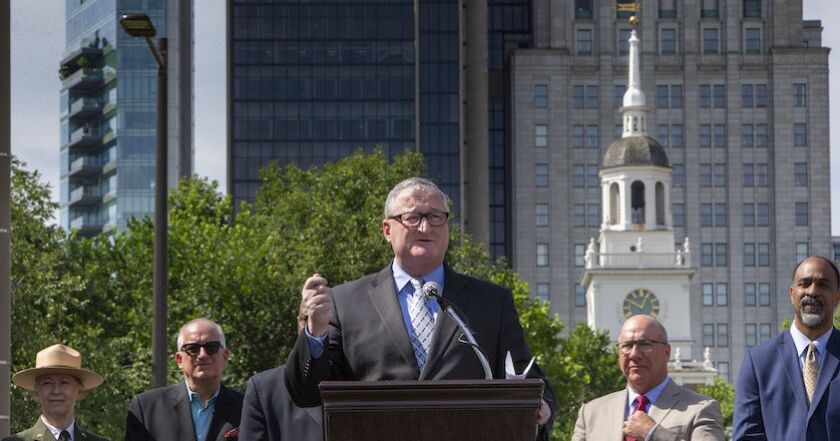Members of the Ohio Mayors Alliance, a bipartisan group of mayors representing the state's 30 largest cities presented highlights of the group's 2023 recommendations during a Thursday media briefing in Columbus.
"Our cities right now are in a very unique position in that with the American Rescue Plan funds we have this unique one-time opportunity to make some strategic investments around our state," said Elyria Mayor Frank Whitfield, the only independent on the panel. "We're proud to be partnering with the governor's office and the legislature on programs like brownfield remediation, water infrastructure, public safety, demolition. And while we get these one-time funds, and these are critically important, they won't last forever. We have to think long-term."
A key threat to cities' fiscal health is remote work and how it affects taxes. Dublin Mayor Jane Fox said it has affected cities' ability to plan an operating budget and to plan for capital projects because of the tax policy that is now unpredictable and difficult to track.
"Remote work has changed the way people work, which is good in many ways, but our primary revenue stream is a municipal income tax. It's the case in ... small cities and large cities," Fox said. "If remote work threatens our revenue stream, then we will not be able to continue to grow Ohio. ... Remote work, even though it's a change, should not threaten the environment of the cities and the towns and villages that depend on the municipal income tax."
Public safety is the largest expenditure for nearly every city in Ohio, said Beavercreek Mayor Bob Stone.
"Police and fire services cost on average half or more of the city's total budget," he said. "Officer training can be a significant part of these costs for cities. ... We must work with state leaders to protect the fiscal health of our cities."
The alliance is recommending the creation of a dedicated funding stream for police officer training to enhance training and to help offset costs for local government. They also support a statewide law enforcement certification and licensing program, for which Stone said Gov. Mike DeWine and some lawmakers have expressed support.
Gun reform recommendations include establishing extreme-risk protection orders, enhancing the state's gun purchasing background check system and implementing a statewide safe storage law, said Cleveland Mayor Justin Bibb.
Gun violence reduction initiatives and youth programs to keep kids off the streets play an important role, but the reform measures are needed components, Bibb said.
"Until we stop the proliferation of guns in our cities and have more power to get guns off the street, none of this, none of this real progress or change will be possible. So we are excited to announce these recommendations and we're optimistic and hopeful that we will receive real compromise from our leaders here in Columbus on these important measures," he said.
The alliance stressed the importance of bipartisanship to arrive at its recommendations, and to work with state leaders.
"(Bipartisanship) is at great risk of dying as a principle in this country," said Kettering Mayor Peggy Lehner, who formerly served in the Ohio House and Senate.
For the first time, the alliance's education committee will launch an educational outreach to work with schools to develop curriculum and after-school activities to teach children about bipartisanship, Lehner said.
"Certainly by the time they reach high school, we ought to have kids who are able to engage in robust conversation and debate without hating each other," she said.
Cincinnati Mayor Aftab Pureval agreed that the strength of the alliance is based on bipartisanship and collaboration.
"But make no mistake, we disagree all the time, just like many other politicians," he said.
The Beavercreek native, who joked he was the only Democrat to come out of the city, said they do agree with the governor and state legislature that in order for Ohio and its cities to be successful, they have to grow.
"We simply cannot grow as a state and as cities and as a community unless we have the investments necessary to provide the basic services that people rely on, to create the dense, diverse communities that are walkable with good public transportation that are attractive to make sure that all of our cities are world destinations to recruit and retain the best and the brightest workforce that we can," Pureval said.
(c)2022 Springfield News-Sun, Ohio. Distributed by Tribune Content Agency, LLC.










